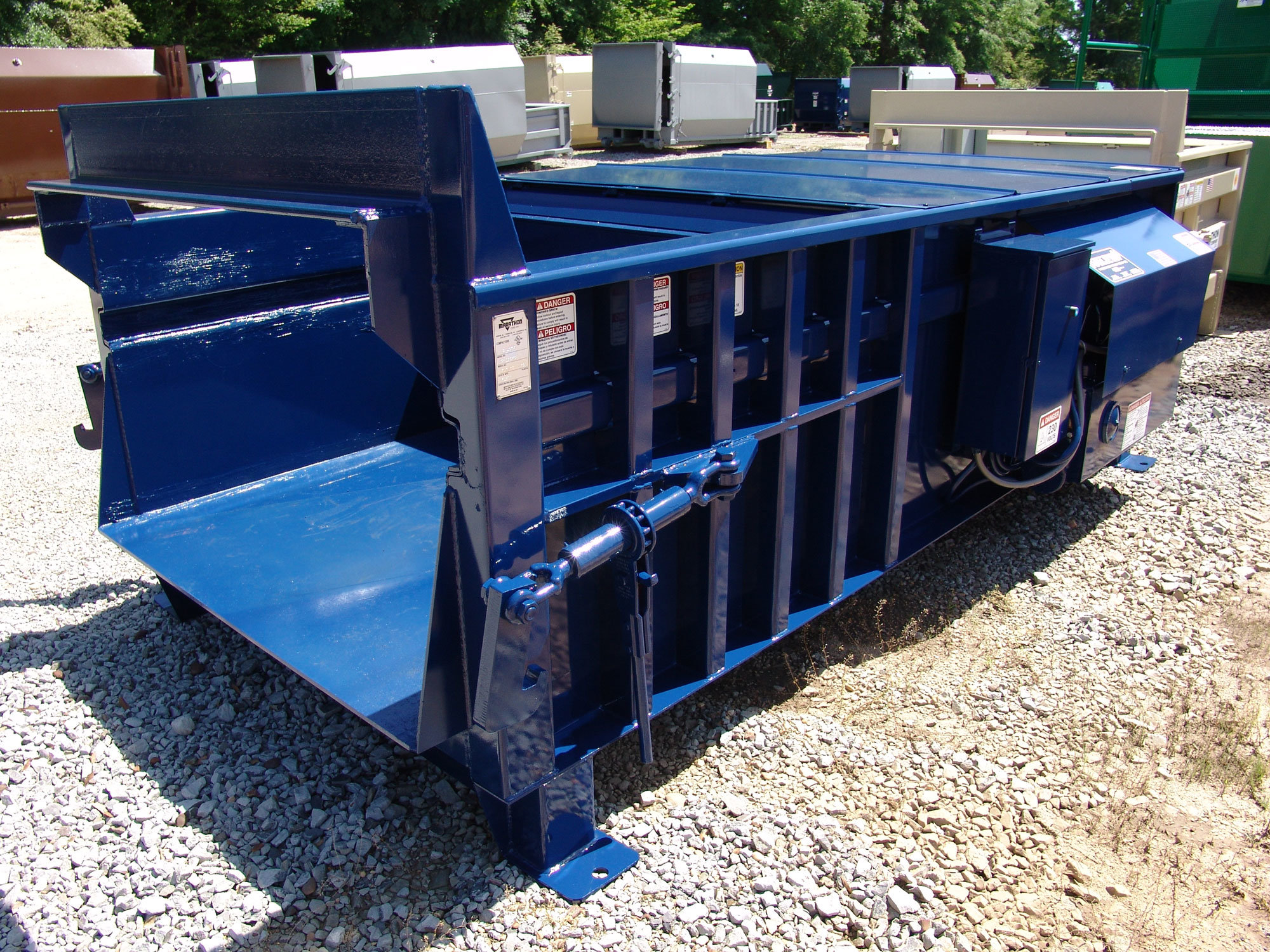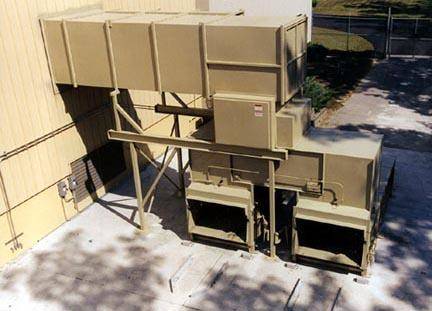How Industrial waste compaction equipment adds eco-friendly initiatives
Wiki Article
Just How Waste Equipment Improves Efficiency in Garbage Compactor Operations
Waste Equipment plays a crucial duty in enhancing the efficiency of garbage compactor procedures. By using innovative sensing units and automation, these systems improve compaction cycles and keep an eye on lots capabilities properly. This combination not only conserves energy yet additionally minimizes pickup regularity and connected costs. As companies progressively adopt these technologies, the implications for operational sustainability and monitoring approaches end up being clearer. What other advantages might emerge from these improvements in waste Equipment?The Function of Advanced Sensors in Compaction Effectiveness
Advanced sensors play a necessary role in improving the effectiveness of trash compactors. These sophisticated devices monitor numerous specifications, consisting of tons capability, wetness degrees, and compaction cycles, permitting real-time changes. By properly assessing the quantity of waste, sensors allow compactors to maximize their procedure, making sure that energy intake is reduced while making best use of the volume of waste refined.In addition, advanced sensors add to anticipating upkeep by determining prospective problems before they result in Equipment failure. This aggressive technique not just decreases downtime yet likewise extends the life-span of the compactor. Furthermore, data collected from these sensing units can be assessed to boost operational methods, bring about boosted waste administration methods. Generally, the assimilation of sophisticated sensing units in garbage compactors considerably boosts their performance and operational performance, converting right into cost savings and an extra lasting technique to garbage disposal.
Sturdiness and Layout: Materials That Issue
The sturdiness and design of garbage compactor hinge greatly on the materials made use of in their building. High-grade steel is commonly the key selection, offering stamina and resistance to use and tear. This robust material endures the enormous stress exerted throughout compaction, ensuring long life and integrity. Additionally, elements such as hydraulic systems are generally crafted from corrosion-resistant alloys to avoid destruction over time, improving functional performance.Layout likewise plays a critical duty in capability; ergonomic forms and calculated reinforcements can substantially impact efficiency. Producers often focus on modular designs, permitting for much easier repair and maintenance. Innovations in coating modern technologies, such as powder finish, improve resistance to environmental aspects, consisting of wetness and chemicals. Ultimately, the cautious choice of materials not only improves the architectural stability of garbage disposal however additionally contributes to their overall effectiveness and performance in waste administration procedures.
Automation and Smart Innovation in Waste Equipment

Moreover, automated compactors can optimize compaction cycles based on the volume of waste, making best use of space and boosting functional performance. Integration with mobile applications enables customers to keep track of and control compactors from remote locations, improving convenience and responsiveness. By taking on these technologies, waste management firms can not just enhance their functional operations but likewise add to more sustainable practices by lessening waste and enhancing resource usage. Overall, automation and smart technology stand for a significant jump onward in you could try this out the effectiveness of garbage disposal procedures.
Information Analytics for Maximizing Waste Management
Utilizing information analytics offers waste monitoring firms an effective tool for enhancing and optimizing operations efficiency. By accumulating and evaluating data from various resources, such as compactor efficiency metrics and waste generation patterns, business can get important insights. These understandings allow them to make informed choices concerning collection schedules, compactor usage, and maintenance demands.Predictive analytics can forecast waste generation fads, enabling business to assign resources more properly and avoid potential overflows or underutilizations of Equipment. Real-time surveillance via data analytics also improves the capability to respond quickly to functional difficulties, decreasing downtime and boosting service reliability.
Furthermore, incorporating information analytics with existing waste management systems cultivates a society of continuous improvement. By recognizing inadequacies and tracking efficiency with time, business can improve their procedures and adopt finest methods, eventually leading to a much more lasting and reliable waste administration approach.
Price Savings Through Enhanced Functional Efficiency
By lessening and improving operations waste, firms can accomplish significant expense financial savings in their waste management procedures. Improved operational effectiveness in garbage disposal lowers the frequency of pick-ups, causing reduced transport prices. Progressed waste Equipment allows for maximum compaction, making the most of container capacity and decreasing the requirement for extra bins.This increased efficiency not only lowers garbage disposal costs but additionally extends the life-span of Equipment, decreasing upkeep expenses. Automated monitoring systems offer real-time data, allowing for aggressive modifications in waste handling, which can furthermore enhance efficiency and decrease unintended expenditures.
Additionally, robust training programs for team on Equipment use can cause boosted operational techniques, even more driving down costs. Eventually, the integration of reliable waste Equipment fosters a cost-efficient waste administration strategy that profits firms financially while ensuring next smoother operations.
Ecological Influence: A Sustainable Strategy to Waste Administration

Additionally, applying recycling campaigns along with compaction processes enables firms to divert products from land fills, advertising circular economic climate principles. Businesses that adopt environmentally pleasant methods not just boost their company obligation however additionally allure to increasingly eco-conscious consumers. By focusing on sustainability in waste administration, organizations can achieve a dual benefit: boosting functional effectiveness while actively contributing to environmental preservation. This well balanced approach positions services as leaders in lasting techniques, fostering a healthier planet for future generations.
Frequently Asked Inquiries
Just How Typically Should Waste Equipment Be Preserved for Ideal Efficiency?
The regularity of upkeep for waste Equipment generally depends upon use and maker suggestions - Industrial waste compaction equipment. Commonly, inspections should happen quarterly, with comprehensive maintenance annually to guarantee peak efficiency and stop prospective break downs or inefficienciesWhat Kinds of Waste Can Be Refined in Garbage Compactors?
Garbage compactor can process various types of waste, consisting of cardboard, paper, plastics, and non-hazardous food waste. Customers must stay clear of condensing hazardous products, steels, and fluids to guarantee effective and risk-free procedure.Are There Security Attributes in Modern Trash Compactors?
Modern garbage disposal frequently include safety features such as automated shut-off devices, emergency situation quit buttons, and sensing unit systems (Industrial waste compaction equipment). These enhancements are developed to shield individuals from possible hazards during operation, advertising a more secure working environmentHow Does Waste Equipment Effect Labor Requirements?
The impact of waste Equipment on labor needs is significant; it typically lowers the need for manual work, simplifying processes and boosting efficiency. Subsequently, less workers are required, enabling companies to designate sources more effectively.What Is the Typical Life Expectancy of a Trash Compactor?
The average lifespan of a garbage disposal typically varies between 10 to 15 years, relying on use, maintenance, and environmental aspects. Routine servicing can extend this lifespan, making certain optimal performance and reliability throughout its operational years.By taking on these technologies, waste monitoring companies can not only boost their functional workflows yet additionally add to more lasting practices by lessening waste and optimizing resource use. By lessening and enhancing procedures waste, companies can attain considerable expense savings in their waste monitoring procedures. Sustainable waste monitoring methods, specifically in garbage compactor operations, reference add considerably to reducing land fill waste and decreasing carbon footprints. Modern waste Equipment is made to optimize compaction, thereby lowering the volume of waste requiring disposal. Trash compactors can refine numerous kinds of waste, consisting of cardboard, paper, plastics, and non-hazardous food waste.
Report this wiki page